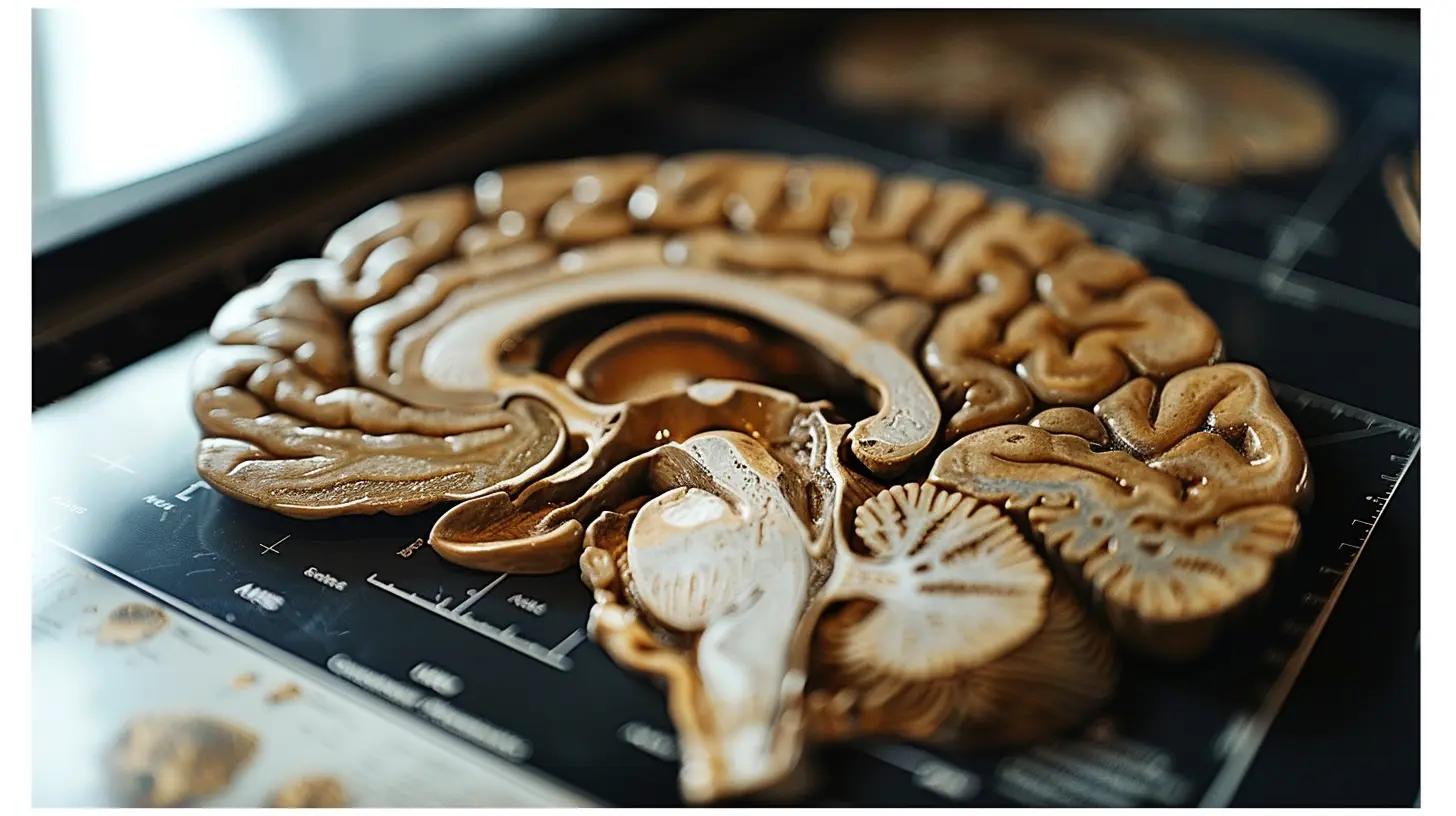Mental Illness and the Brain: What Science Tells Us
24 September 2025
Mental illness often gets misunderstood, mislabeled, or brushed under the rug. But the truth is, mental disorders are just as real as physical illnesses—and they often start deep within the most complex organ of all: the brain. So what does science really say about this connection? How does the brain play a role in shaping mental health? What are the biological roots of conditions like depression, anxiety, schizophrenia, and bipolar disorder?
Let’s unpack the science behind it—all explained in simple, straight-up talk.
Understanding Mental Illness: Not Just "In Your Head"
Let’s clear something up straight away: mental illness isn't a weakness, a personal failure, or "all in your head" in the way people sometimes mean it. It’s rooted in real changes—biological, chemical, structural—happening in your brain.Imagine your brain like a supercomputer. If something goes off with the software (neurotransmitters, signals, brain circuits), or even the hardware (structure, size of certain areas), things can misfire. You might feel constantly down, overwhelmed, disconnected, or unable to think straight. That’s not laziness or lack of willpower. That’s real science.
The Brain's Role in Mental Illness
Your brain is the command center of everything you do—thinking, feeling, moving, reacting. So when something shifts in the brain’s chemistry or structure, it can dramatically affect how you feel and behave.Neuroscientists have been exploring the link between brain function and mental health for decades. Thanks to advanced imaging tools like MRI and PET scans, we can now see how mental illnesses correlate with changes in brain activity and structure. Here's what we've found so far.
1. Neurotransmitters: The Brain's Chemical Messengers
Think of neurotransmitters like text messages sent between brain cells. They transmit crucial info to keep your mood, energy, sleep, and focus in check.- Serotonin – Low levels are linked with depression and anxiety.
- Dopamine – This one’s associated with pleasure, motivation, and reward-seeking behavior. It often goes haywire in conditions like schizophrenia or addiction.
- Norepinephrine – Plays a role in stress response and alertness. It’s often off-balance in people with anxiety or PTSD.
When these neurotransmitters don’t do their job correctly, it disrupts the brain’s internal balance, much like a car misfiring when the fuel-air mixture is off.
2. Brain Structure and Mental Illness
Certain areas of the brain are more involved in mental disorders than others. Let’s break it down:- Prefrontal Cortex – This part handles decision-making, impulse control, and social behavior. In people with depression or ADHD, this area often shows reduced activity.
- Amygdala – Your brain’s "fear center." It plays a key role in how you process emotions like fear and aggression. In anxiety disorders, the amygdala tends to go into overdrive.
- Hippocampus – Helps regulate emotions and store memories. Shrinking of the hippocampus is commonly seen in those with long-standing depression and PTSD.
When these areas get damaged, shrink, or don’t function properly, it throws emotional regulation and behavior off-course.
3. Genetics and Mental Illness
Ever heard someone say, “It runs in the family”? Well, they’re not wrong.Genetics can contribute significantly to mental health conditions. If you have a parent or sibling with a mental disorder, your risk increases. But—and this is key—genes aren’t destiny.
You might inherit a vulnerability, but environment, stress, and lifestyle can either activate or silence those genes. That’s where the concept of epigenetics comes in: it’s like having a light switch in your DNA that can be turned on or off depending on your experiences.
4. Brain Inflammation and Immune Response
Here's something wild—your immune system might have a bigger role in mental illness than we once thought.New research shows that inflammation in the brain could contribute to depression, schizophrenia, and bipolar disorder. When your body’s immune response goes into overdrive (due to infection, stress, or even poor gut health), it can cause inflammation in the brain. This, in turn, messes with neurotransmitter function and emotional regulation.
It’s like having a small fire in your brain: it burns slowly but changes the entire environment inside your head.
How Mental Illness Affects Daily Brain Function
Mental illness doesn’t just change what you feel—it actually reshapes how your brain operates day-to-day.- Memory and Focus – Many disorders affect working memory and attention. That’s why people with depression often feel like they’re living in a mental fog.
- Decision Making – Anxiety can cause paralysis when trying to make even small decisions, because the brain is constantly scanning for threats.
- Sleep Patterns – Your circadian rhythm (your internal body clock) gets disrupted, leading to insomnia or hypersomnia in depression and bipolar disorder.
- Emotional Regulation – With less control in areas like the prefrontal cortex and overactivity in the amygdala, your emotional response can be exaggerated or blunted.
Think of your mental health as the operating software—and if there’s a bug in the program, the entire system slows, glitches, or crashes.
The Mind-Body Connection: It's All Linked
Let’s not forget: your brain is part of your body. The two aren’t separate ecosystems. In fact, what’s happening in your gut, immune system, or hormones can directly affect your mental state.- Gut Health – Your gut makes 90% of the body's serotonin. A messed-up gut can lead to low mood.
- Chronic Illness – Living with long-term conditions like diabetes or chronic pain increases the risk of depression and anxiety.
- Hormonal Imbalances – Fluctuations in things like cortisol (the stress hormone) can seriously affect mood.
So sometimes the brain is the driver, and sometimes it’s the passenger—but they’re always riding in the same car.
Treatment: How We Target the Brain to Treat Mental Illness
Now that we understand more, how do we treat mental illness with this brain-based perspective in mind?1. Medication: Correcting Chemical Imbalances
Medications like antidepressants, antipsychotics, and mood stabilizers aim to rebalance neurotransmitter levels. They don’t cure the illness, but they can make the symptoms way more manageable.Think of them like eyeglasses—you still have the same eyes, but your vision improves because the lenses correct the focus.
2. Psychotherapy: Rewiring Thoughts and Behaviors
Cognitive Behavioral Therapy (CBT) and other forms of talk therapy aren’t just emotional support—they can actually change the brain. MRI scans have shown changes in brain activity after therapy sessions, especially in areas involved in emotional regulation.Therapy is like going to the gym for your brain—you build healthier mental muscles over time.
3. Lifestyle Adjustments: Supporting Brain Health
- Exercise – Boosts blood flow to the brain and increases natural endorphins.- Nutrition – Fuels your brain with the right nutrients to function well.
- Sleep – Essential for brain repair and mood stabilization.
- Mindfulness and Meditation – Proven to reduce amygdala activity and enhance prefrontal cortex function.
Combined, these tools can drastically improve quality of life—even if the root illness doesn’t go away entirely.
So, What Does This Mean for Us?
Here’s the takeaway: mental illness is not imaginary, not a personal failure, and definitely not something you can just “snap out of.” It’s a deeply rooted brain-based condition with real biological and chemical changes behind it.But the good news? Science is catching up. We understand more about the brain and mental health than ever before. With each study, each scan, and each breakthrough, we're moving closer to treatments that work better, stigma that fades, and support that everyone deserves.
If you've ever struggled with mental illness, just know—your brain is not broken. It's just wired differently. And with the right tools and support, you can help it run more smoothly.
Final Thoughts
Mental illness isn’t a choice—it’s a result of a complex dance between brain chemistry, genetics, environment, and lived experience. Science has come a long way in mapping the brain and figuring out what goes wrong when mental health takes a hit.But perhaps the most profound truth is this: understanding the brain helps us build empathy. It reminds us that those facing mental illness aren’t weak, lazy, or making it up—they’re navigating real, scientific brain-level challenges.
And armed with that knowledge, we can better support ourselves, our loved ones, and society as a whole.
all images in this post were generated using AI tools
Category:
Mental IllnessAuthor:

Gloria McVicar
Discussion
rate this article
1 comments
Stephen Good
This article beautifully highlights the intricate connection between mental illness and brain function. It's important to approach these topics with empathy, reminding us that understanding can lead to compassion and support for those affected.
October 15, 2025 at 3:47 AM

Gloria McVicar
Thank you for your thoughtful comment! I completely agree that empathy and understanding are crucial in addressing mental illness and supporting those affected.


